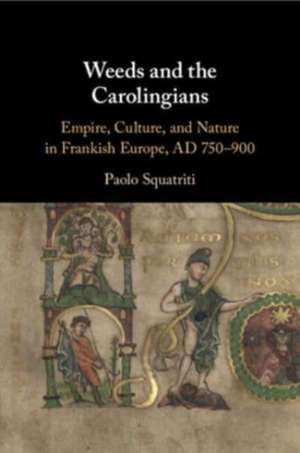Weeds and the Carolingians
Autor Paolo Squatritien Limba Engleză Paperback – 30 mai 2024
| Toate formatele și edițiile | Preț | Express |
|---|---|---|
| Paperback (1) | 199.58 lei 22-36 zile | +13.50 lei 5-11 zile |
| Cambridge University Press – 30 mai 2024 | 199.58 lei 22-36 zile | +13.50 lei 5-11 zile |
| Hardback (1) | 529.54 lei 43-57 zile | |
| Cambridge University Press – 8 iun 2022 | 529.54 lei 43-57 zile |
Preț: 199.58 lei
Nou
Puncte Express: 299
Preț estimativ în valută:
38.19€ • 39.98$ • 31.60£
38.19€ • 39.98$ • 31.60£
Carte disponibilă
Livrare economică 17-31 martie
Livrare express 28 februarie-06 martie pentru 23.49 lei
Preluare comenzi: 021 569.72.76
Specificații
ISBN-13: 9781009069342
ISBN-10: 1009069349
Pagini: 238
Dimensiuni: 152 x 229 x 13 mm
Greutate: 0.35 kg
Editura: Cambridge University Press
ISBN-10: 1009069349
Pagini: 238
Dimensiuni: 152 x 229 x 13 mm
Greutate: 0.35 kg
Editura: Cambridge University Press
Cuprins
1. Weeds, nature, and empire; 2. Weeds on the ground; 3. The time of weeds; 4. The worst of weeds; 5. The botany of paradise in Carolingian Rome; 6. The uses of weeds; 7. The politics of weeding in the Carolingian Empire; Epilogue.
Recenzii
'This delightful book teems with plants that refuse to be mastered. Farmers wrangled with them in the fields. Ideologues grappled with them in their politics. And readers will be captivated by them, not least for Squatriti's revelation that weeds were double-agents - both antagonists and protagonists in early medieval culture.' Jamie Kreiner, University of Georgia
'Paolo Squatriti explores a new corridor between the territories of Carolingian history and environmental history, examining good and bad weeds as sensitive proxies of material usages, perceptions, and representations in Charlemagne's age. In a subsistence agriculture, weeds played a critical role according to time rather than available space. Based on a wide range of readings, Squatriti's book brilliantly illustrates how the tools of history, archaeology, palaeobotany, agronomy and linguistics can converge in a cultural history of how medieval people inhabit the world.' Jean-Pierre Devroey, Free University of Brussels
'This is a brilliantly conceived book, which reveals the deep and tangled relationships between political thought and the natural world. The ways in which people think about 'good' plants and 'invasive' or 'bad' ones relates directly to their ideas about order, governance, and productivity; while these issues are of fundamental importance to society now, Squatriti shows just how much thinking around them changed in the Carolingian world. In between late Latin and vernacular, and between local practice and normative ideals, Squatriti reveals how words for weeds, explanations for their existence, tools for their removal (both physical and metaphorical) were tied to emerging forms of knowledge and authority. Squatriti's scholarly eye is omnivorous, and he draws comparisons, and seeks explanations in unpredicted yet outstandingly insightful places. This book draws with equal expertise upon archaeobotany, intellectual history, and religious reform literature to trace the ways in which ideas about everyday life, food, crops, and land management shifted in a new political world.' Caroline Goodson, University of Cambridge
'Paolo Squatriti explores a new corridor between the territories of Carolingian history and environmental history, examining good and bad weeds as sensitive proxies of material usages, perceptions, and representations in Charlemagne's age. In a subsistence agriculture, weeds played a critical role according to time rather than available space. Based on a wide range of readings, Squatriti's book brilliantly illustrates how the tools of history, archaeology, palaeobotany, agronomy and linguistics can converge in a cultural history of how medieval people inhabit the world.' Jean-Pierre Devroey, Free University of Brussels
'This is a brilliantly conceived book, which reveals the deep and tangled relationships between political thought and the natural world. The ways in which people think about 'good' plants and 'invasive' or 'bad' ones relates directly to their ideas about order, governance, and productivity; while these issues are of fundamental importance to society now, Squatriti shows just how much thinking around them changed in the Carolingian world. In between late Latin and vernacular, and between local practice and normative ideals, Squatriti reveals how words for weeds, explanations for their existence, tools for their removal (both physical and metaphorical) were tied to emerging forms of knowledge and authority. Squatriti's scholarly eye is omnivorous, and he draws comparisons, and seeks explanations in unpredicted yet outstandingly insightful places. This book draws with equal expertise upon archaeobotany, intellectual history, and religious reform literature to trace the ways in which ideas about everyday life, food, crops, and land management shifted in a new political world.' Caroline Goodson, University of Cambridge
